Some 40 years ago, a schoolboy told his teacher that he was going to be a Labour TD for Tipperary when he grew up.
North Tipperary in the 1980s was by no means a Labour party stronghold, yet Alan Kelly remained true to his word. He was elected to the Dáil in 2011 and in the two subsequent general elections.
On Wednesday night, he struggled to compose himself as he announced his short-lived reign as party leader was over. There was a peculiar atmosphere on the Leinster House plinth as an emotional Mr Kelly resigned. He was surrounded by the TDs and Senators who had collectively decided to oust him after two years in charge.
There was time for some humour, however. "If there was a choice between saving the world and saving the Labour party, the world would be easier," Mr Kelly joked.
That quip originated in the 1980s when former Labour leader Frank Cluskey noticed Michael D Higgins was absent as the party was going through some internal strife.
After learning that the future president was in the Middle East, Mr Cluskey said: "Trust Michael D to take the easy option: saving the world over saving the Labour party."
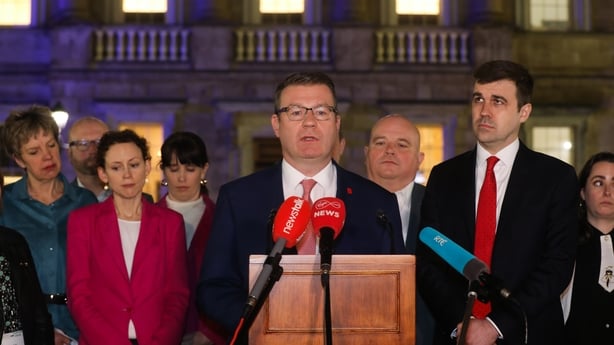
History has shown that the notion of the Labour party being in some form of existential crisis is not a new one.
But the party's collapse from winning 37 Dáil seats in the 2011 "Gilmore Gale", under the leadership of Eamon Gilmore, to just seven seats in 2016, and six seats in 2020, has thrown the party’s future into doubt like no other time in the past.
Labour Senator Marie Sherlock acknowledged on RTÉ’s Morning Ireland on Thursday that her party is in a "fight for survival".
While politicians always play down the significance of opinion polls, Mr Kelly did say in his resignation address that Labour has not made the progress he would have liked in opinion polls under this leadership. The party polled at just 4% in last weekend’s Red C poll for the Business Post.
Richard Colwell, CEO of Red C Research, told Prime Time: "They are sort of stuck in the mud. There hasn’t been a major shift for the party for a long time. Not since they were in government in 2016. They used to be about 10% and then got a boost [in 2011]."
"Since they came out of Government in 2016, they are struggling to get back to where they were. Part of the problem is that the Labour vote is split by the setting up of the Social Democrats – and some of their support has been stolen away."
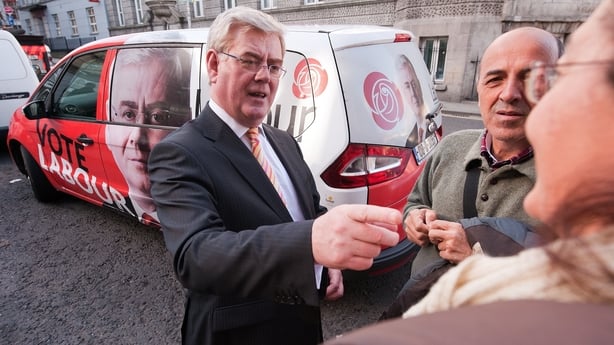
Mr Colwell is a bit puzzled as to why Alan Kelly did not get a bounce in the polls and said: "He certainly got a huge amount of coverage for some of the things he was doing, but their vote share didn’t seem to increase."
The pollster said that, usually, if politicians "make noise and get heard", they would expect party support to increase. "Labour didn’t get a boost because we were in abnormal times where all parties had to rally around the flag with Fine Gael and Fianna Fáil," Mr Colwell told Prime Time.
Mr Kelly did say that being a new party leader during the pandemic was particularly difficult. He was restricted to Zoom meetings with party membership at a time when the new leader would have preferred to have been out and about, "pressing the flesh" among Labour’s grassroots.
Ray Kavanagh, a former general secretary of the Labour party, told Prime Time that it is now valid to ask if the Labour party can survive.
"It is going to be very, very tight. The party’s future is on a tightrope at the minute," he said.
He said he is disappointed that Mr Kelly was "not given a chance, as he was barely given two years".
He pointed out that most rank-and-file members of Labour supported Alan Kelly’s leadership bid two years ago. Now, he has been "decapitated before he even had a chance to see out a full Dáil term, contest a general election or even local elections".
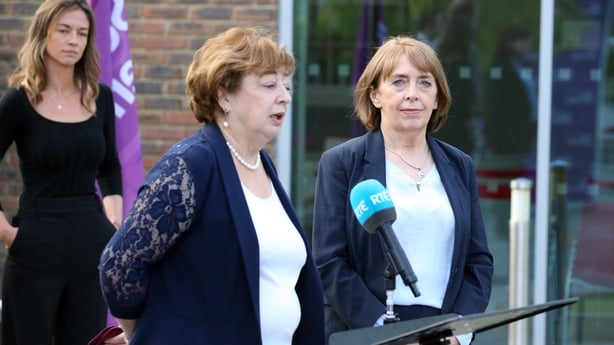
Veteran pollster Sean Donnelly used to refer to the Labour as "the half in the Irish two-and-a-half party system."
But the political landscape has transformed over the last decade. Labour’s traditional core vote has been split with the emergence of the Social Democrats.
The rise of Sinn Féin has been more significant. Sinn Féin has taken votes and seats in working class areas – in places such as Cork, Dublin, and Limerick – where Fianna Fáil and Labour traditionally thrived.
Senior Labour party figures have told Prime Time that Ivana Bacik will take over from Mr Kelly to become the 14th leader of party since it was founded in 1912.
Mr Kavanagh told Prime Time that Ms Bacik will have to try and bring back the traditional working-class Labour party vote.
He added: "She comes from the liberal wing of the party, but there are more working-class votes out there. A lot of the liberal votes are concentrated in Dublin and the east coast, but Ivana will have to go beyond that."
He also stressed the need to work with the Social Democrats. This is something that many TDs in both parties do not want to entertain. But, for some outsiders looking in, the idea has merit.
Mr Colwell said Labour and the Social Democrats have "very similar profiles". He said that a strong argument can be made for the two parties joining forces as "they would have more clout and credibility."
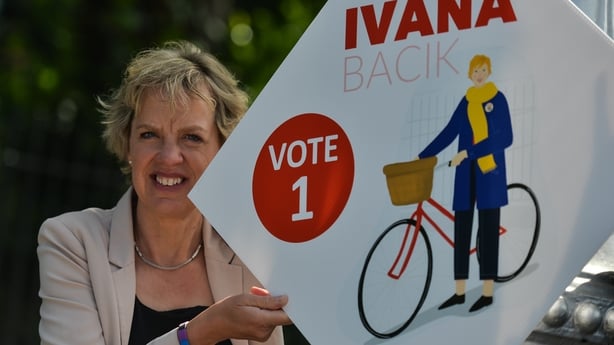
"If they were at 8 to 10%, they would have momentum and be seen as a serious option for coalition, even with Sinn Féin," he said.
He added that there have been "pretty dark noises from both sides about joining up, but it does seem to make sense."
A former senior Labour party advisor told Prime Time: "It is almost inevitable that there will be a merger between Labour and the Social Democrats. The division makes no sense and is largely personality driven."
Asked about the Labour party’s prospects of survival, he said: "No party has the right to survive or exist. It has to justify its existence for every election and every generation."
"The Labour party is in a difficult position. The world of politics has massively changed. There are more parties and more competition. The certainties of the past are gone.Just because you got a vote in the past does not mean you will get it in the future."
He added that there are also opportunities for Labour because of the volatility in Irish politics. He pointed to Sinn Féin’s poor result in the 2019 local and European elections – and how that party’s fortunes have transformed since then.
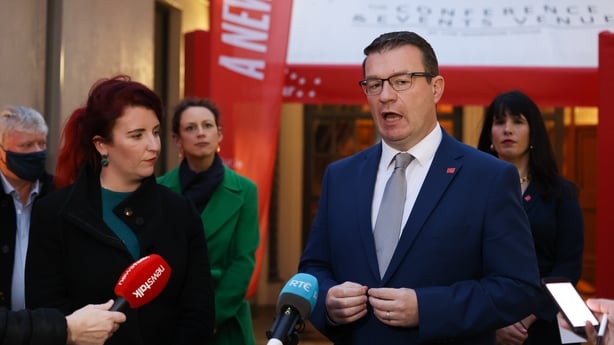
He said that Labour has a proud record in delivering on the "liberal agenda" in areas such as divorce legislation, same-sex marriage, and abortion.
Now after such huge social change, he said there was an opportunity for Labour to be relevant.
"The by-election in Dublin Bay South also showed that candidates matter. The right candidate in the right constituency matters," the former advisor said.
"Policy matters but candidates matter. Labour has good candidates in a lot of constituencies that will get elected."
He said there is a solid base of people like Sean Sherlock who has held his seat in Cork and Ged Nash and Aodhán Ó Ríordáin who lost their seats and won them back. He also pointed to Senators Marie Sherlock, Rebecca Moynihan and Mark Wall who can potentially win Dáil seats.
He added that Labour now "needs to be relevant on a smaller number of topics because they are a smaller party."
As questions about the party’s future remain, Mr Colwell did point out that Irish voters are "extraordinarily fluid" in terms of their support for political parties at the moment.
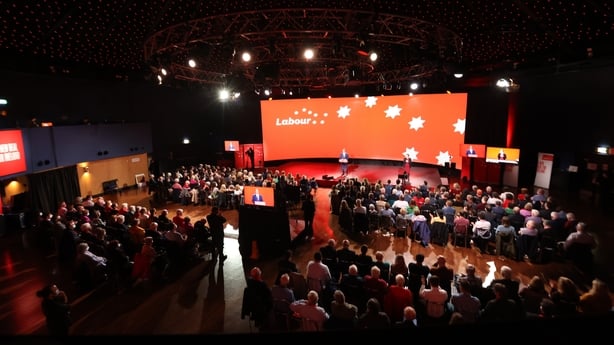
"They will shift to the option that is the most appropriate at that moment in time. People are no longer voting for one party all their lives so opinion polls could change relatively quickly. We have seen that with Sinn Féin."
Labour supporters will live in the hope that a bounce in support comes soon to lift them out of the current existential crisis.
Alan Kelly, the man with the brash image and a reputation that made him known as "AK-47" went meekly into the night after a quiet revolution in his party.
So will Labour survive or go meekly into the night like its 13th leader?
"I wouldn’t write off the Labour party but I wouldn’t say it has a guaranteed future," the former advisor told Prime Time.
"You have to talk about modern issues, in a modern way, to a modern electorate. The financial crash [and the fallout] is more than a decade ago. Politics is about the now and the future," he said.
"Your past does not determine your future. The Labour party need to forgive themselves and move on."





